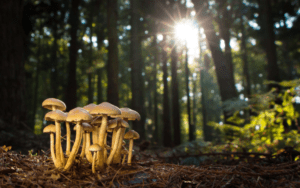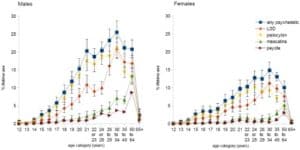History of Psilocybin Mushrooms
Commonly known as “mushrooms”, “magic mushrooms”, or “shrooms”, these fungi have been used in religious rituals for over 6,000 years due to their psychedelic properties. Psilocybin mushrooms were first mentioned in medical literature in 1799, but it wasn’t until 1958 that French botanist, Roger Heim, identified the hallucinogenic substances in the fungi as psilocybin. Throughout the 1960s, mushrooms became popular among the hippie counterculture, along with other hallucinogens such as LSD and DMT. Many psychologists, botanists, and chemists believe that specific components of the drug may help treat mood disorders but have been unable to properly research due to the 1970 passing of the Controlled Substances Act in which psilocybin mushrooms are classified as a Schedule I drug, citing its high potential for abuse, no approved medical uses, and having the potential to cause severe side effects or poisoning. In 2020 Oregon became the first U.S. state to decriminalize psilocybin mushrooms and legalize them for therapeutic use.

The Mushroom High
Mushrooms are commonly eaten or brewed in tea. They produce a high in which the user experiences:
Euphoria
Excessive laughter
Visual and auditory hallucinations
Increased energy
Increased strength
Anxiety
Paranoia
Side Effects of Mushroom Abuse
Long-term mushroom abuse can cause lasting effects and irreversible damage. Such side effects include:
High blood pressure
Tremors
Panic attacks
Hallucinogenic Persisting Perception Disorder (HPPD)
Psychosis
Chronic anxiety or depression
Mushroom Use in the United States
According to the National Center for Biotechnology Information, There were approximately 32 million lifetime psychedelic users in the US in 2010 and, the new legality of psilocybin mushrooms in certain states and regions has since increased the drug’s recreational usage. Some medical experts have expressed concern with the psychedelic properties of mushrooms posing a risk to those with pre-existing mental health issues although the drug rarely poses serious health risks. In the graph below, psilocybin mushrooms rank as the second most used hallucinogenic drug in the United States.

Mushroom Addiction Treatment
Mushrooms are addictive and life-threatening when abused; therefore, it is extremely important to seek help immediately if you or a loved one is struggling with this addiction. At Asheville Recovery Center, treatment specialists utilize a 12-step program and practice holistic rehabilitation, providing one of the best drug treatment programs in North Carolina.
Services at the center include:
Partial Hospitalization Program – At Asheville Recovery Center we offer a partial hospitalization program for clients who need post-residential treatment as well as for clients who need primary treatment but are unable to enroll in inpatient programs. Our PHP track offers a variety of therapeutic services and benefits to individuals in early recovery from substance addiction. Our day program is full-time, offering all of the clinical hours provided in residential treatment (from 9 am to 5 pm) with the benefit of allowing clients to return home to a structured sober living environment at night. This gives individuals the opportunity to build a community of peers and practice life skills, such as cooking, cleaning, and self-care, while still participating in immersive and intensive clinical addiction and trauma treatment.
Outpatient Rehabilitation – During intensive outpatient treatment, clients live at home or in a sober living residence which can help keep them accountable for their recovery commitment. Our staff coordinates with local, reputable sober living homes to ensure that our clients are living in a safe place and that their needs are being met, even when they are not at clinical sessions. During this time, clients are also encouraged to become involved in local twelve-step fellowships, to find sponsors, and to begin working the steps of recovery through participation in these groups. IOP is a place where clients can process their experiences in twelve-step fellowships and support one another in those individual journeys.
Addiction is difficult to overcome alone. If you feel that you or a loved one is struggling with mushroom abuse, our specialists are on standby and ready to help. Call (828)383-0784 and speak with an addiction expert today.






